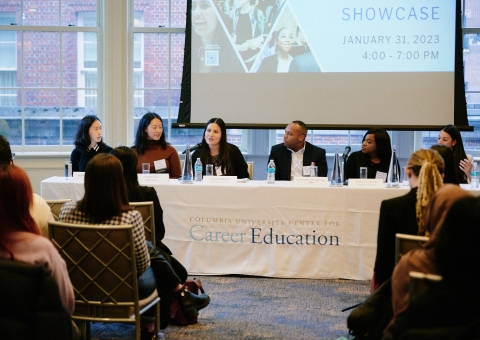If you have a visible or invisible disability, you may have many questions during the job or internship search process.
We’re here to help. We can support you by:
- providing advice around your questions and concerns
- helping you build confidence by focusing in on your unique strengths
- directing you to other beneficial resources
Common Questions from Students with Disabilities
- How can I evaluate a workplace to determine whether an employer will be supportive and suit my indivdiual needs and values?
- Should I, how could I, and when would I disclose my disability to an employer?
- What is considered a “reasonable accommodation” and how might I request one?
- Beyond accommodations, how can I informally ask for what works best for me?
- How do I prepare for an interview and request accommodations if needed?
- How can I highlight strengths I bring to the workplace?
Schedule a 30-minute career counseling appointment to discuss these and other questions with a career counselor.
Factors to Consider around Disability Disclosure
When or where should you disclose your disability?
This is a very personal decision. We recommend taking into consideration these suggestions from the US Department of Labor:
There is no one ‘right’ time or place to disclose […] Consider the following stages:
- In a letter of application or cover letter;
- Before an interview;
- At the interview;
- In a third-party phone call or reference;
- Before any drug testing for illegal drugs;
- After you have a job offer;
- During your course of employment; or
- Never.
“Youth, Disclosure, and the Workplace: Why, When, What, and How.” The Office of Disability Employment Policy. Retrieved June 2019.
Deciding Whether to Disclose: Reflection Questions
Take some time to reflect on each of the prompts below when are you considering your decision around disclosure:
- What are the advantages and disadvantages of disclosing?
- Will not disclosing severely impact my work or interview performance?
Keep in mind: It’s best to disclose before performance is lowered due to lack of accommodation. You might want to disclose when you first become aware of any difficulties, whether when completing an application, during pre-hire employment testing, or at any other stage.
- Is there any workplace barrier that might impact my performance or ability to learn?
Remember, you are not obligated to disclose!
Disclosure Tips: If You Do, If You Don’t
If you do not choose to disclose…
- Consider reevaluating this decision every 6 months.
- Check in with your supervisor about work performance periodically.
- Ask yourself whether your disability is affecting your performance of key job tasks. If yes, you might consider disclosing.
If you choose to disclose…
TIPS for preparing to disclose
- Research whether the company or organization is required to provide a reasonable accommodation.
- If they have 15+ employees, they are required to do so.
- Know your rights. Review the Americans with Disability Act (ADA).
- Research company processes for handling accommodation requests.
- Use ASK JAN or connect with Columbia’s Disability Services to determine possible solutions for accomodations.
- Practice or role-play different disclosure scenarios and possible outcomes with a CCE career counselor.
- Consider creating a paper trail with your accommodation request or disclosure.
- Build an alliance and support system at work.
TIPS FOR Disclosing
- Do so in a confidential place.
- Allow time for questions.
- Focus on the positive. Don’t dwell on any limitations.
- Provide recommendations or solutions for accommodations since you know your needs best. Be your own best advocate!
- Simply stating you need an adjustment to your work environment or change at work due to a medical reason is sufficient. You do not have to disclose personal details or share with all colleagues. Your employer is required to keep all information confidential relating to your disability or medical condition.
Evaluating the Workplace: Considerations
Highlighting Your Strengths
As a person with a disability you have a unique perspective on the world, which can be a huge asset to employers. Consider all of the qualities and skills you have gained from overcoming challenges related to your identity. CCE career counselors can work with you individually to unpack the strengths, assets, and qualities you can bring to your future employer.
Strategies for Evaluating the Workplace
- Examine the company website carefully. Is there an ADA or diversity-related statement?
- Assess the company’s culture, values, traditions, interactions, and beliefs. Do the company’s mission and values align with your own?
- Connect with alumni or other students who have interned there to get an in-depth look at the work culture. You may find LinkedIn helpful in identifying these current or former employees.
- Research employee reviews of the company on Glassdoor.
- Review partners of Lime Connect, a nonprofit whose mission is to “rebrand disability through achievement.” Lime Connect works with leading employers who value the talent and strengths of employees with disabilities.
- Gain more information about the hiring process from the organization, a recruiter, or hiring manager.
- Can you ask to see the work environment or work space during or after the interview process?
- Is there an active affinity group?
Resources for Students with Disabilities
Columbia Resources
- Office of Disability Services (ODS): ODS can provide guidance on helpful workplace accommodations. ODS Learning Specialists can help you:
- Discuss your individual disability or medical condition, including any concerns you have about transitioning from school to the workplace.
- Guide you in taking a strengths-based approach to fully understand your skills and what you bring to the workplace. This will further ground a conversation around any accommodations you may need to help you reach your full potential at work.
- Practice talking about your disability with confidence with supervisors and colleagues and through different forms of communication (both in-person and digital communication).
- Brainstorm potential accommodations based on your needs, specific work environment, personal strengths and challenges.
- Center for Career Education (CCE): Schedule a career counseling appointment at CCE for support around:
- Exploring careers and roles
- Preparing application materials
- Preparing for interviews
- Networking interactions
- Engaging in CCE services and resources
- Evaluating the workplace
- Deciding if, when, and how to disclose a disability
- Resources with ideas for accommodations
We can offer you the opportunity to discuss topics related to evaluating a workplace, disclosure, and informal requests and accommodations; to consider tips and resources; and/or to practice or role-play disclosure during a career counseling appointment.
External Resources
- Job Accommodation Network (JAN): Helps people with disabilities increase their employability and on-the-job success
- Offers a variety of resources in the Individuals section, including General Rights under the Americans with Disabilities Act (ADA) which we encourage you to review.
- Offers a Searchable Online Accommodation Resource (SOAR) to see examples of accommodations in both work and educational settings.
- Lime Connect: Prepares and connects accomplished individuals with disabilities for careers with the world’s leading corporations and offers free coaching services to members.
- Specialisterne USA: Works with businesses to hire neurodivergent employees and connects qualified neurodivergent candidates to employment opportunities
- Mentra: Is a neurodiversity employment network, harnessing the cognitive strengths of software, UX, and data professionals
- Entry Point: Identifies and recruits science, engineering, mathematics, computer science, and business students with disabilities for internship opportunities
- Neurodiversity Career Connector: Lists opportunities from employers committed to neurodiversity-focused hiring initiatives across many industries
- American Association of People with Disabilities (AAPD): Is a Civil Rights Organization that advocates to equalize opportunity for over 60 million Americans with disabilities
- Review their Summer Internship Program.




